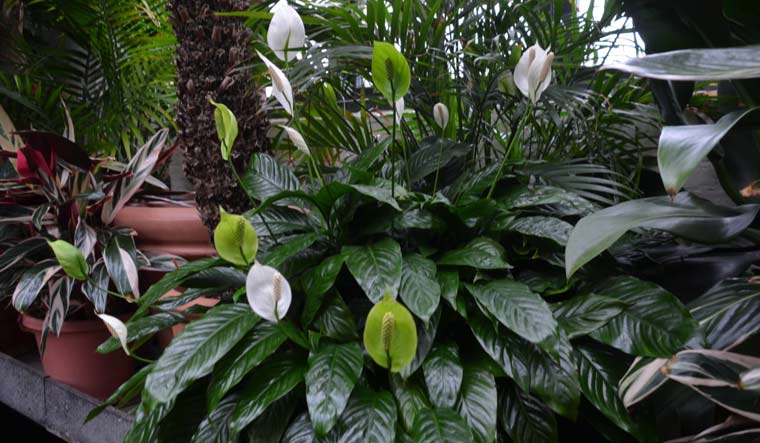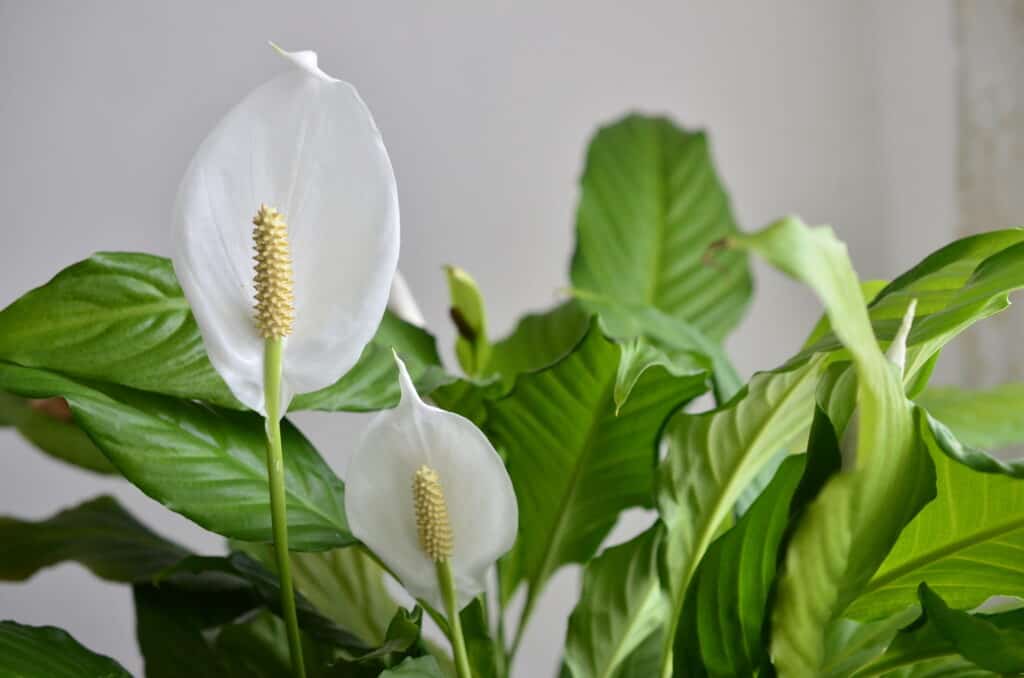17 incredible peace lily benefits
The peace lily, also known as the spathe flower, closet plant, or white sails plant, is a popular indoor plant that is known for its shade-loving qualities. It is a great houseplant for the home or workplace, as it helps purify air and brightens up living spaces. This article provides a detailed explanation of the benefits of the peace lily, urging its adoption.
About peace lily
Spathiphyllum, a genus of flowering plants native to tropical Americas and Southeast Asia, belongs to the Araceae family.
Tropical peace lilies thrive on forest floor, requiring indirect sunlight, constant humidity, and moisture. Maintaining these conditions in the house environment ensures their happiness and health.
Peace lilies bloom in early summer with light, producing white to off-white flowers that can continue to bloom year-round under suitable conditions.
Most household peace lilies, unlike larger outdoor cultivars with 6 feet leaves, only reach a height of 16 inches and are only suitable for warm, humid climates, as they are not cold-hardy plants.
Now read this article to find out: Why is my peace lily leaves turning brown?
Peace lily benefits
The Peace Lily enhances the interior of your house, providing physical and mental benefits while enhancing the appearance of your living room.
Air purification properties
Peace lilies are beneficial indoor plants due to their ability to purify air, which can be contaminated with harmful gases and VOCs. They can absorb contaminants like benzene, xylene, trichloroethylene, carbon monoxide, and formaldehyde, according to a NASA experiment. By eliminating sources of pollutants and providing adequate ventilation, peace lilies can reduce toxic compounds in the air. Additionally, peace lilies add moisture to the air, making it comfortable to breathe.
A Low-maintenance plant
Peace lilies are low-maintenance plants that thrive in medium to low light conditions. They produce beautiful white spathes and blossoms with more light, while less light results in less blooms and a more conventional foliage appearance.
Overwatering is a common issue in caring for peace lilies, which is the most common cause of death. Peace lilies are more tolerant of underwatering, so it’s best not to water them regularly but to check them weekly to determine if they need watering.
Reducing the Stress
A study suggests that plants in homes and workplaces can enhance comfort, calmness, and naturalness, making a peace lily plant a beneficial addition to reduce stress and anxiety, thereby increasing productivity.
Less mildew formation
Moisture in restrooms, kitchens, baths, and laundry rooms promotes mold and mildew growth. Peace lilies can counteract this by absorbing excess moisture from the air, reducing moisture on walls and drapes, thus inhibiting mold and mildew growth.
Eliminating mold spores
The peace lily is one of many plants that reduces the number of mold spores in the air. Peace Lily, if watered properly, will minimize the number of mold spores found in the air.
It is frequently feared that indoor plants may develop allergy-inducing mold. To prevent mold formation on the soil surface, it is crucial that the soil supporting a Peace Lily does not stay wet.
The peace lily is beneficial for those susceptible to mold spores, as it helps reduce respiratory symptoms such as irritability, coughing, and sneezing. It also helps those with chronic respiratory diseases like asthma, as mold exposure can cause significant symptoms. Keeping a peace lily indoors helps eliminate mold spores.
Easy propagation
The peace lily can be enhanced by propagating it by cutting the mother plant into smaller pieces. The number of plants grown depends on the plant’s size and the number of crowns it has.
Divide the peace lily plant by gently removing a part of the crown from the mother plant or cutting sections with a sharp knife. Crowns should have attached roots and at least two leaves. Pot up new plants, including the mother plant, by removing loose roots or leaves with brown tips after inspecting the roots and foliage.
Feng shui plant
The peace lily, a popular plant in feng shui, is known for its white blossoms that symbolize purity, peace, and prosperity, ensuring a positive and energetic environment in a room.
Feng Shui practitioners suggest that a peace lily can transform negative energy into positive ones, potentially boosting singles’ love chances. This lucky symbol of abundance and prosperity, also enhances concentration and looks great on a desk.
A multipurpose gift
Whether you are buying them for a friend, family member, or spouse, Peace lilies are one of those gifts that surely bring a smile to their face. Depending on the situation, the Peace Lily can have a range of symbolic connotations.
Sympathy
These plants symbolize peace and prosperity, making them ideal for those experiencing hardships and wishing success in the new year.
Forgiveness
Peace lilies symbolize a truce in recent arguments, with their white blossoms resembling a flag being waved, making them an effective method for seeking forgiveness.
funeral flower
Peace lilies are a common alternative for funeral flowers as they can convey sympathy. These are thoughtful options to send to someone who has lost someone or to bring to a funeral.
bedroom houseplant
The last peace lily benefit is that they make wonderful bedroom plants. Nearly everyone in the world has trouble falling or staying asleep. These houseplants can help people have a nice sleep.
It improves humidity levels, filters indoor air, and makes breathing easier. Additionally, it promotes restful sleep by absorbing airborne mold spores, which are typical allergies. Furthermore, the beauty of these plants is known to promote calmness by reducing stress-related feelings in the body and mind.
According to Feng Shuai, peace lily is one of the most incredible bedroom plants since it infuses the space with positive energy and a calming atmosphere.

The Benefits of Peace Lily Plants
Now, while houseplants are beautiful, many offer benefits beyond their decorative purposes. Peace lilies are among the beneficial plants you can grow at home. Here is a brief overview of the uses and benefits of peace lily plants:
- They can remove toxins from the air.
- These plants help manage indoor humidity levels.
- They have Feng shul benefits.
- They’re easy to care for compared to other plants.
- They contribute beautiful decor to your home.
- Peace lily propagation is relatively easy.
- The species tolerates various lighting conditions.
- It may help reduce the microbes and allergens in its environment.
- It tolerates varying watering schedules.
- Peace lilies may help with stress reduction and mental health.
- The plant may support a more productive working environment.
- Peace lilies may help you get a better night’s sleep.
Here are some key facts about the Peace lily plant:
|
Particulars |
Description |
|
Common Name |
Peace lily, Spathe lily |
|
Botanical Name |
Spathiphyllum |
|
Family |
Acraea |
|
Plant Type |
Perennial |
|
Mature Size |
1-4 ft. wide (indoors), up to 6 ft. tall (outdoors) |
|
Sun Exposure |
Partial |
|
Soil Type |
Moist but well-drained |
|
Soil pH |
Acidic |
|
Bloom Time |
Spring |
|
Flower Color |
White, yellow |
What are peace lilies good for?

1. It purifies the air: Air purification is crucial for human health, as homes contain numerous pollutants that cause health issues. Proper ventilation and removing sources of these pollutants can control harmful gases and VOCs. House plants like peace lily’s, also known as cobra plants, can help reduce these pollutants. NASA experiment showed that peace lily plants can absorb pollutants like benzene, xylene, carbon monoxide, and formaldehyde, eliminating 60% of them. This process also adds moisture to the air, making it suitable for breathing. Overall, proper air purification and ventilation are essential for maintaining good health.
2. It’s a low maintenance house plant: Many people prefer low-maintenance indoor plants for their busy schedules. The peace lily is an excellent choice due to its ability to survive without sunlight and use bright indoor light from indirect sunlight. Its glossy green leaves and big white bracts make it an attractive indoor plant. With its low requirements, many indoor plant growers choose the peace lily as their top choice.
3. Absorbs acetone vapors: The peace lily plant not only protects against external pollutants but also helps prevent harmful vapors from home products like varnishes, paints, rubbing alcohol, and nail polish removers, which can cause health issues like headaches, coordination issues, low blood pressure, acetone poisoning, and lethargy. Keeping a peace lily in your home helps keep the air free from these harmful vapors, making it a healthier environment for you.
4. Promotes restful sleep: Indoor plants are beneficial for insomnia and poor sleep, as they filter indoor air, increase humidity levels, and improve breathing. They also absorb common allergens like mold spores, aiding in good sleep. The beauty of these plants brings calmness and alleviates stress. According to Feng Shui, they are the best bedroom plant, as they bring positive energy and a peaceful touch to the room. Overall, indoor plants are an excellent choice for promoting restful sleep and overall well-being.
5. Perfect to spruce up home décor: This indoor plant offers numerous health benefits and adds beauty to any space. Its curved bract white flowers and green foliage make it a standout addition to home décor. Choose a decorative pot to enhance its beauty and place it on tables, shelves, or at a corner to make your home look sophisticated and appealing. The plant’s beauty can be enhanced by its decorative pot.
6. Prevents formation of mildew: High moisture content in washrooms, bathrooms, and kitchens can lead to mildew formation, visible on tile grout and bathroom curtains. A peace lily can thrive in these environments and prevent further mildew formation by absorbing excess moisture. This reduces dampness on walls and curtains, hampering the growth of mold spores and mildew, despite the damaging effects of these harmful bacteria in homes.
7. Removes mold spores from the air: The peace lily is a beneficial flower plant that helps eliminate mold spores in the air, particularly beneficial for those sensitive to mold, such as those with asthma or chronic lung illness. Exposure to mold spores can cause eye, cough, sneezing, throat, and skin irritation. The peace lily is also used as an ornamental plant in the office, believed to bring good fortune, peace, hope, and prosperity. It also eliminates harmful radiation from computers and television, making it a perfect gift for both personal space and the home. In summary, the peace lily is a valuable addition to any home or office.
Is peace lily good for humans?

Peace lily contains small, insoluble calcium oxalate crystals in its flowers, leaves, and stems. Ingestion of this part can cause discomfort, mouth and throat irritation, lip swelling, coughing, nausea, and vomiting. Most minor ingestions can be managed at home, but exploratory or minor ingestions can cause immediate discomfort.
To clean a peace lily plant, gently wipe out the mouth, help rinse and spit with water to remove any remaining pieces, offer ice chips or frozen treats to relieve mouth irritation, and avoid giving large volumes of fluids if the person is experiencing excessive drooling, severe mouth swelling, or difficulty swallowing.











